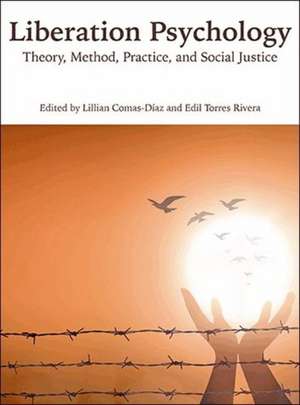Liberation Psychology – Theory, Method, Practice, and Social Justice: Cultural, Racial, and Ethnic Psychology Series
Autor Lillian Comas–díaz, Edil Torres Riveraen Limba Engleză Paperback – 27 iul 2020
Preț: 450.81 lei
Nou
Puncte Express: 676
Preț estimativ în valută:
86.27€ • 90.18$ • 72.90£
86.27€ • 90.18$ • 72.90£
Carte disponibilă
Livrare economică 13-27 februarie
Preluare comenzi: 021 569.72.76
Specificații
ISBN-13: 9781433832086
ISBN-10: 1433832089
Pagini: 314
Dimensiuni: 190 x 253 x 16 mm
Greutate: 0.59 kg
Editura: Wiley
Seria Cultural, Racial, and Ethnic Psychology Series
ISBN-10: 1433832089
Pagini: 314
Dimensiuni: 190 x 253 x 16 mm
Greutate: 0.59 kg
Editura: Wiley
Seria Cultural, Racial, and Ethnic Psychology Series
Cuprins
Series Foreword
Frederick T. L. Leong
Foreword: How APA Has Promoted Social Justice
Melba J. T. Vasquez
Introduction
Part I. Liberation Psychology Theory
1. Liberation Psychology: Origins and Development
Part II. Liberation Psychology Method
4. From Freud to Fanon to Freire: Psychoanalysis as a Liberation Method
Part III. Liberation Psychology Clinical Practice
7. Testimonios
Part IV. Liberation Psychology and Special Populations
10. Black Minds Matter: Applying Liberation Psychology to Black Americans
Part V. Liberation Psychology Social Action
13. Liberation Psychology, Creativity, and Arts-Based Activism and Artivism: Culturally Meaningful Methods Connecting Personal Development and Social Change
Conclusion. Liberation Psychology—Crossing Borders Into New Frontiers
Frederick T. L. Leong
Foreword: How APA Has Promoted Social Justice
Melba J. T. Vasquez
Introduction
Edil Torres Rivera and Lillian Comas-Díaz
Part I. Liberation Psychology Theory
1. Liberation Psychology: Origins and Development
Mark Burton and Raquel Guzzo
2. Concepts of Liberation PsychologyEdil Torres Rivera
3. Liberation Psychology and RacismRaúl Quiñones-Rosado
Part II. Liberation Psychology Method
4. From Freud to Fanon to Freire: Psychoanalysis as a Liberation Method
Daniel Gaztambide
5. Liberation Psychology of and for Transformative Justice: Centering Acompañamiento in Participatory Action ResearchJesica Siham Fernández
6. Feminist Participatory Action Research: Coconstructing Liberation Psychological Praxis Through Dialogic Relationality and Critical ReflexivityM. Brinton Lykes and Gabriela Távara
Part III. Liberation Psychology Clinical Practice
7. Testimonios
Alejandro Cervantes
8. Urban Liberation: Postcolonial Intersectional Feminism and Developing a Socially Conscious Therapeutic PracticeChakira M. Haddock-Lazala
9. Liberation PsychotherapyLillian Comas-Díaz
Part IV. Liberation Psychology and Special Populations
10. Black Minds Matter: Applying Liberation Psychology to Black Americans
Thema Bryant-Davis and Shavonne J. Moore-Lobban
11. Liberation Psychology and LGBTQ+ Communities: Naming Colonization, Uplifting Resilience, and Reclaiming Ancient His-stories, Her-stories, and T-storiesAnneliese A. Singh, Brean’a Parker, Anushka R. Aqil, and Falon Thacker
12. Transnational Feminist Liberation Psychology: Decolonizing Border CrossingsKathryn L. Norsworthy and Ouyporn Khuankaew
Part V. Liberation Psychology Social Action
13. Liberation Psychology, Creativity, and Arts-Based Activism and Artivism: Culturally Meaningful Methods Connecting Personal Development and Social Change
Ester R. Shapiro
14. Liberation, Inspiration, and Critical Consciousness: Preparing the Next Generation of PractitionersCarrie Castañeda-Sound, Daryl M. Rowe, Nahaal Binazir, and Marlene L. Cabrera
Conclusion. Liberation Psychology—Crossing Borders Into New Frontiers
Lillian Comas-Díaz and Edil Torres Rivera
Notă biografică
Descriere
Liberation psychology challenges traditional Western-based psychology by offering an emancipatory approach to understanding and addressing oppression. This book explores the origins, development, and key concepts of liberation psychology; its methods; its potential future applications; and its relation to social activism and social justice.




